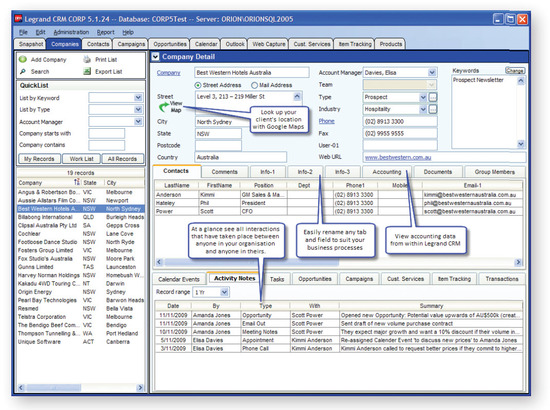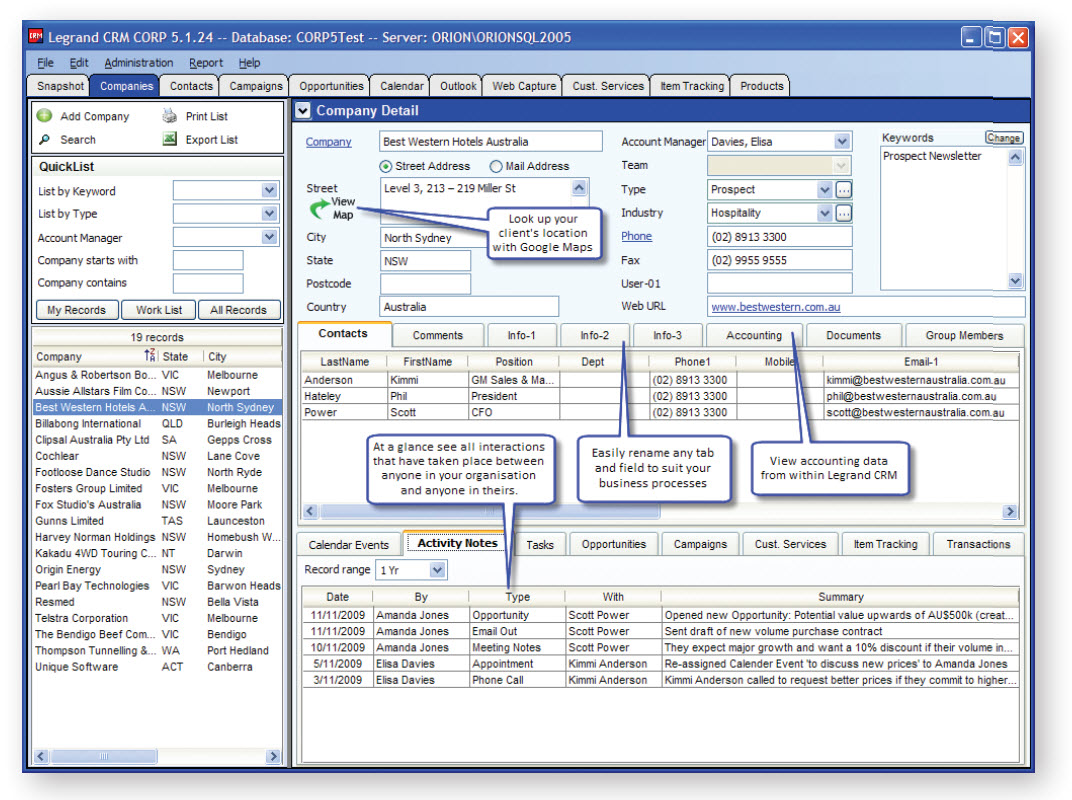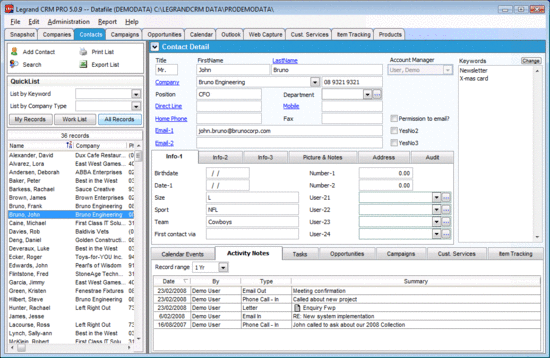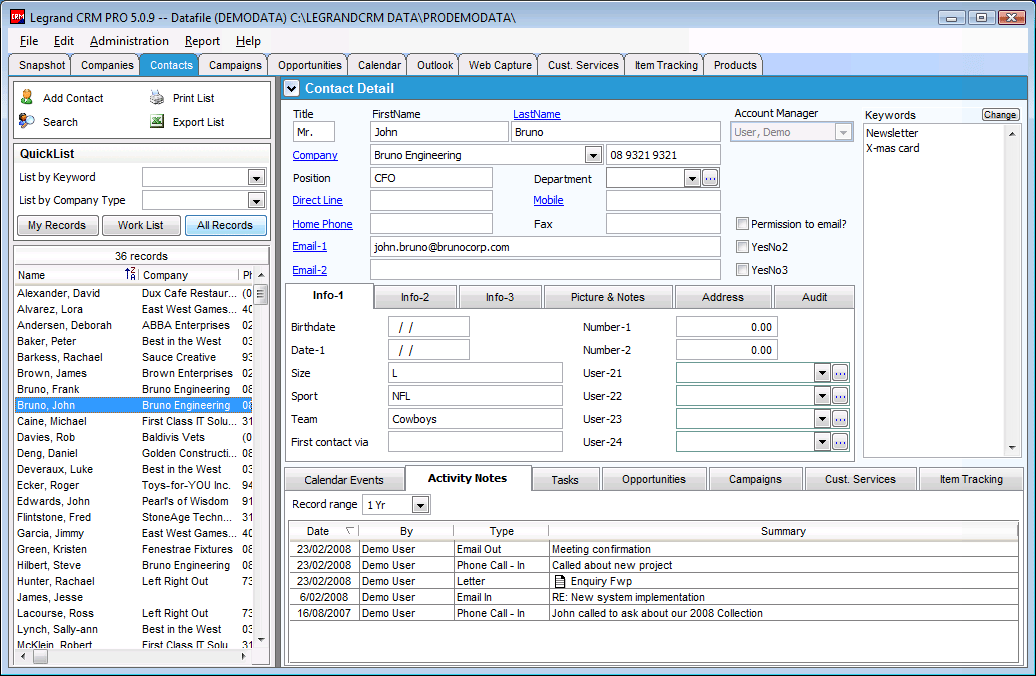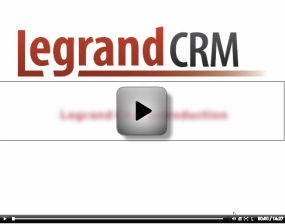Overview of Company & Contact Management
One of the distinct benefits of a single CRM solution is that all data regarding companies and contacts your business interacts with are stored in a single system. Legrand is designed to make it easy to store, retrieve and utilise information at these two levels.
The company and contact areas are the foundation of CRM. Legrand CRM makes is extreamly easy to see all company and contact related information from one central screen.
The two level structure revolves around the collection of company and contact names, addresses, type and additional classifications. Additionally activity notes (recorded letters, emails, phone calls and alike), calendar events and tasks sent by Legrand users are stored against these records. This enables users (with appropriate access levels) to lookup a company or contact, review their particulars and also see a listing of correspondence meetings tasks and alike that have or are going to occur between that company/contact and other internal Legrand users.
The following explains some of the key functions of the company and contact screens within Legrand CRM.
Companies/Organisations
When managing your business it is important to look beyond individual contacts and be able to take a business view of your relationship with customers. Rather than just viewing information about one particular contact at a time it is much more informative to have access in one screen to all the contacts at an organisation and all the interactions that have taken place, no matter what type of interaction it was or who it was with.
The Legrand's company screen delivers a consolidated view of all the business-to-business information:
Core information – this contains detailed information about the company, such as street and postal address, phone, fax, web URL, company type, comments field, multiple user fields, accounting fields and a link field that enables you to link the company record to another organisation.
Keywords –Legrand CRM delivers unlimited flexibility for creating company lists and groupings through its Keyword functionality. Create any number of Keywords and use them as information tags to group together any number of companies. Legrand CRM delivers a one-click retrieval of all companies that belong to a specified Keyword group.
Contact lists – all the contacts that belong to the organisation are listed, together with key details such as position, phone and mobile phone. Simply double-click to drill-down into the contact record.
Documents – Every company record has a document repository where you can store important documents relating to that organisation. Note that you can also attach any type of documents to any Activity Note.
Accounting – The financial relationship with Customers is an important facet of any business relationship. Legrand CRM links with accounting systems and enables you to exchange address information back and forth, and import Customer balances and Customer sales figures from the accounting system.
Appointments - a consolidated list of all the appointments with any contact at that company.
Activity Notes – a consolidated list of all correspondence to or from internal users with contacts at this company. This includes emails, phone calls, letters and alike.
Tasks – a consolidated list of all the Tasks that are associated with any contact at that company.
Sales Opportunities – a consolidated list of all the current and past sales opportunities with that company.
Customer Service (also known as jobs or projects)– (optional module) a consolidated list of all the customer service issues, outstanding and resolved, with that company.
Legrand CRM stands out in business management, in one super-informative view you are provided with all company data (be it customer, supplier or otherwise and business interactions.
Contacts
The contacts screen is very similar in layout, the obvious difference being that information relates to a specific individual. As a result contact details such as emails, direct phone and mobile numbers are stored here. Additionally another set of user definable fields enables users to track information unique to contacts examples could include an individual's personal interests and/or birth date. As with companies the same functions relating to searching and list management exist. Once a contact is select users also have access to historical information such as correspondence calendar events and tasks.
Core data fields – this contains detailed information about the company, such as street and postal address, phone, fax, web URL, company type, comments field, multiple user fields, accounting fields and a link field that enables you to link the company record to another organisation.
Keywords – Contact Keywords are used as information tags to group together any number of contacts. There is no limit to how many Keywords you can define or how many keywords you can assign to a contact. Simply use a new Keyword any time you need to create a new grouping or list, and then recall this list at any time with a single mouse click. Using Keywords is without doubt the most flexible method of managing mailing lists, interest lists, project lists and alike
Appointments – a consolidated list of all the appointments with this contact
Activity Notes – a consolidated list of all the Activity Notes (correspondence) to or from internal users with contacts at this company. This includes emails, phone calls, letters and alike.. Double-click to drill-down into the Activity record and view the full details, including any attached documents or emails.
Tasks – a consolidated list of all the Tasks that are associated with this contact. Double-click to drill-down and view full details.


